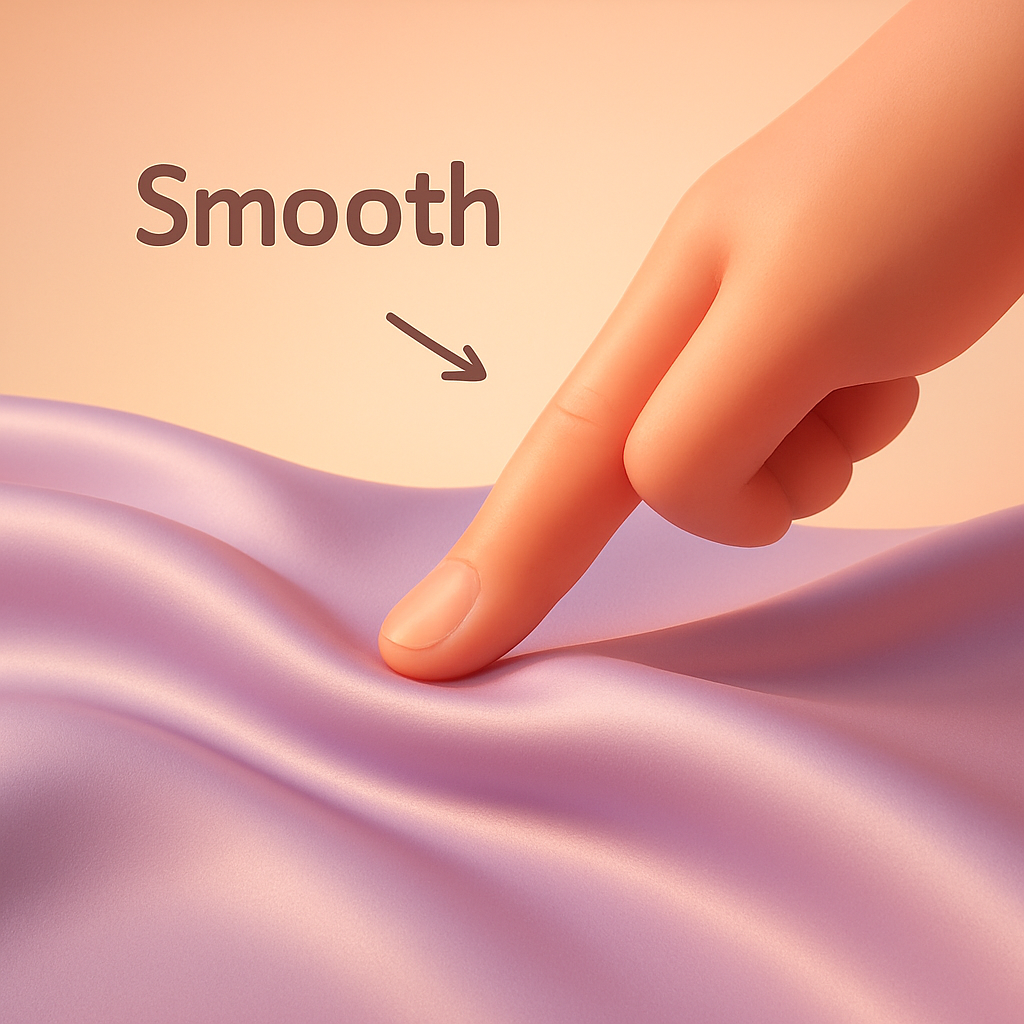Smooth
Definition
The term "smooth" describes a surface without roughness, unevenness, or bumps. It can also refer to an action or process that is easy and free of difficulties, or to a person who is charming and polished.
Parts of Speech
- Adjective
- Verb
Pronunciation
American English
- IPA Pronunciation: /smuːð/
- Respelling: SMOOTH
British English
- IPA Pronunciation: /smuːð/
- Respelling: SMOOTH
Etymology
The word "smooth" originates from Old English "smōð," meaning "free from roughness or irregularities," and is derived from Proto-Germanic "*smōtha." The word has retained its core meaning throughout its linguistic history.
Derivatives
- Smoothly (adverb)
- Smoothness (noun)
- Smoothie (noun, informal)
- Smoothen (verb)
- Smoother (noun)
Synonyms
- Even
- Sleek
- Polished
Antonyms
- Rough
- Bumpy
- Uneven
Usage
The term "smooth" is used to describe surfaces, actions, or personalities. For example: "The table has a smooth finish," or "He delivered a smooth speech without any hesitation."
Related Terms
- Flat: Having a level surface without curves or bumps.
- Glossy: Shiny and smooth in appearance.
- Seamless: Perfectly smooth or without interruptions.
Detailed Definitions
Adjective
- Having a flat or even surface: Refers to a texture free of roughness or irregularities.
- Example: "The silk fabric felt smooth to the touch."
- Easy or free from difficulties: Refers to a process or action that proceeds without issues.
- Example: "The transition between scenes was smooth and seamless."
- Polished and charming in behavior: Refers to a person's demeanor or manner of speaking.
- Example: "He has a smooth way of convincing people."
Verb
- To make something flat or even: Refers to the action of removing roughness or irregularities.
- Example: "She smoothed the wrinkles out of the fabric."
- To ease or facilitate a process: Refers to making something run more efficiently.
- Example: "He worked to smooth the negotiations between the two parties."
smooth



🇨🇳 Mandarin
- 光滑 (smooth as in texture) - guānghuá
- IPA: /kwɑŋ˥˥xwa˧˥/
- Respelling: kwang-hwa
- 顺利 (smooth as in process) - shùnlì
- IPA: /ʂwən˥˥li˥˥/
- Respelling: shwen-lee
🇮🇳 Hindi
- चिकना (smooth as in texture) - chikna
- IPA: /ʧɪknə/
- Respelling: chik-na
- सुचारु (smooth as in process) - sucharu
- IPA: /suʧaːru/
- Respelling: soo-cha-ru
🇪🇸 Spanish
- Suave (smooth as in texture) - suave
- IPA: /ˈswaβe/
- Respelling: swa-ve
- Fluida (smooth as in process) - fluida
- IPA: /ˈflwiða/
- Respelling: flwi-tha
🇫🇷 French
- Doux (smooth as in texture) - doux
- IPA: /du/
- Respelling: du
- Fluide (smooth as in process) - fluide
- IPA: /flyid/
- Respelling: flu-eed
🇸🇦 Modern Standard Arabic
- ناعم (smooth as in texture) - naa'im
- IPA: /naːʔim/
- Respelling: naa-eem
- سلس (smooth as in process) - sals
- IPA: /sals/
- Respelling: sals
🇧🇩 Bengali
- মসৃণ (smooth as in texture) - mosrino
- IPA: /moʂɹiɳ/
- Respelling: mo-shri-no
- সমস্যাহীন (smooth as in process) - somosyaheen
- IPA: /ʃɔmɔʃʃaːhin/
- Respelling: sho-mo-shya-heen
🇷🇺 Russian
- Гладкий (smooth as in texture) - gladkiy
- IPA: /ˈɡlatkʲɪj/
- Respelling: glat-kiy
- Без проблем (smooth as in process) - bez problem
- IPA: /bʲez ˈproblʲem/
- Respelling: byez problem
🇵🇹 Portuguese
- Suave (smooth as in texture) - suave
- IPA: /swɐˈvɨ/
- Respelling: swa-vee
- Sem problemas (smooth as in process) - sem problemas
- IPA: /ˈsẽj pɾoˈbɫemɐʃ/
- Respelling: sen pro-ble-mash
🇮🇩 Indonesian
- Halus (smooth as in texture) - halus
- IPA: /haˈlus/
- Respelling: ha-loos
- Lancar (smooth as in process) - lancar
- IPA: /ˈlantʃar/
- Respelling: lan-char
🇩🇪 German
- Glatt (smooth as in texture) - glatt
- IPA: /ɡlat/
- Respelling: glat
- Reibungslos (smooth as in process) - reibungslos
- IPA: /ˈʁaɪ̯bʊŋsloːs/
- Respelling: raib-ungs-los
🇯🇵 Japanese
- なめらかな (smooth as in texture) - namerakana
- IPA: /namerakana/
- Respelling: nama-raka-na
- スムーズな (smooth as in process) - sumūzuna
- IPA: /sɯmuːzɯna/
- Respelling: su-moo-zu-na
🇻🇳 Vietnamese
- Mịn (smooth as in texture) - mịn
- IPA: /miɲ˧˥/
- Respelling: min
- Suôn sẻ (smooth as in process) - suôn sẻ
- IPA: /sʊən ʂɛ˧˧/
- Respelling: suon se
🇰🇷 Korean
- 부드러운 (smooth as in texture) - budeureoun
- IPA: /bu.dʌ.ɾʌ.un/
- Respelling: boo-deu-reo-un
- 원활한 (smooth as in process) - wonhwalhan
- IPA: /wʌn.hwʌl.han/
- Respelling: wun-hwal-han
🇹🇷 Turkish
- Düz (smooth as in texture) - düz
- IPA: /dyz/
- Respelling: dyz
- Sorunsuz (smooth as in process) - sorunsuz
- IPA: /soɾunˈsuz/
- Respelling: so-ruun-suuz
🇵🇰 Urdu
- ہموار (smooth as in texture) - hamwar
- IPA: /ɦəmˈʋaːr/
- Respelling: ham-war
- رواں (smooth as in process) - rawaan
- IPA: /rəˈʋaːn/
- Respelling: ra-waan





